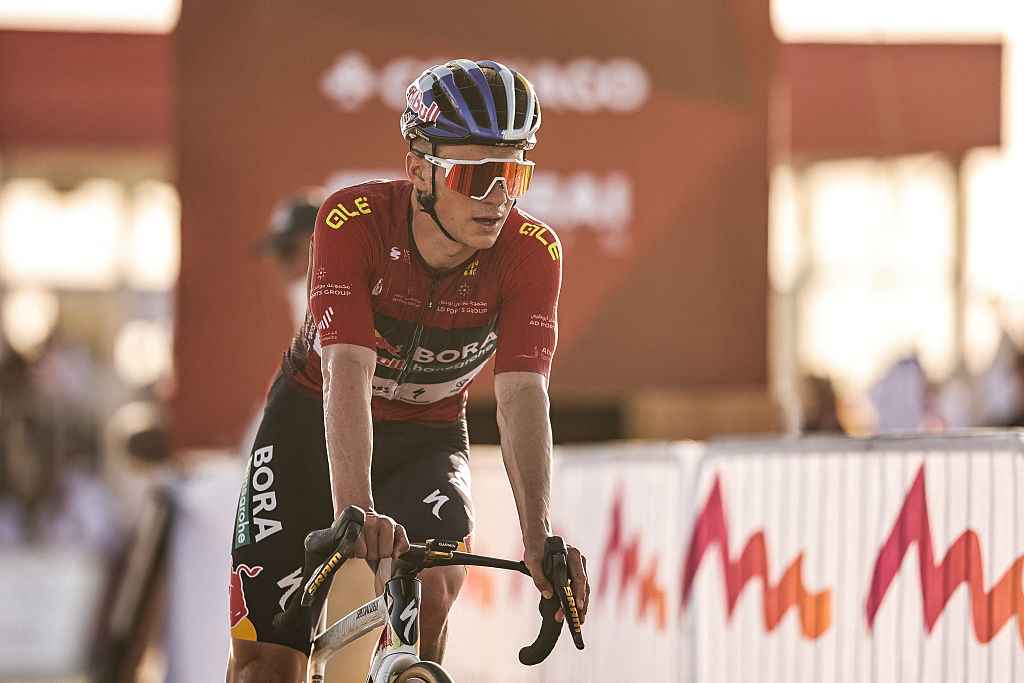The long goodbye - Tom Dumoulin leaves cycling on his own terms
Giro d'Italia crash of 2019 proved a turning point in Dutchman's career
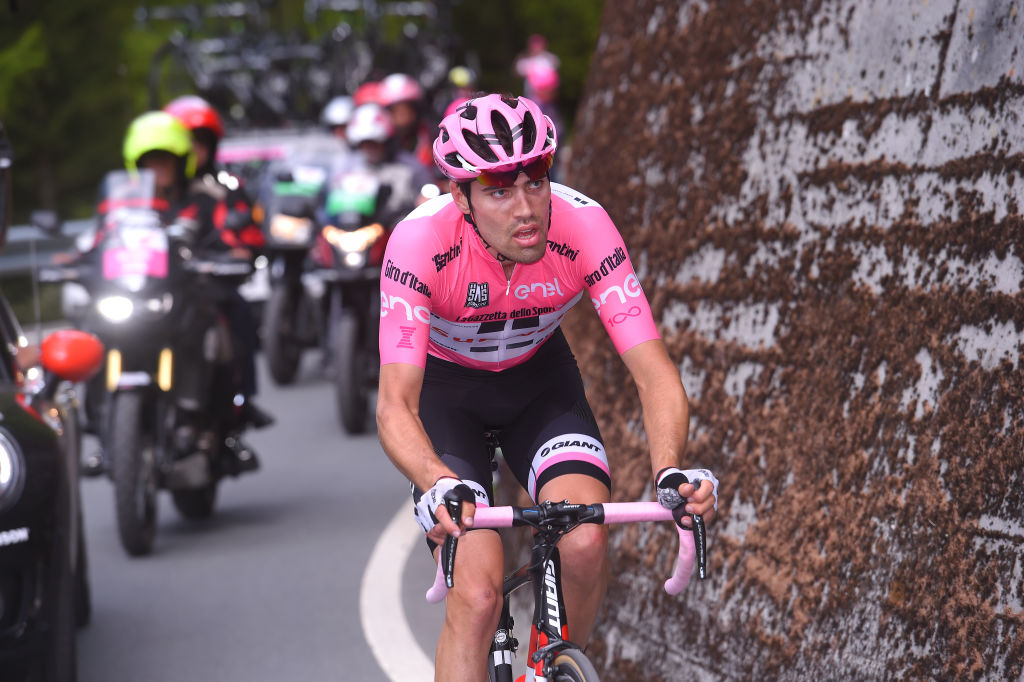
The latest race content, interviews, features, reviews and expert buying guides, direct to your inbox!
You are now subscribed
Your newsletter sign-up was successful
Tom Dumoulin had the rare gift of riding fast without ever really looking like he was in a hurry, and his decision to hang up the bike this week was in keeping with that style. The final announcement came more quickly than expected, but the reasoning behind it was anything but rushed. Like most things in Dumoulin’s career, the end arrived only after considerable, careful thought.
Perhaps it was apt that Dumoulin formally took his leave just as cycling’s big top was being pitched in Utrecht for the start of the Vuelta a España. Seven years ago, when the Tour de France visited the city, local eyes were all for Dumoulin, who was tipped to become the first Dutchman to wear the yellow jersey in over a quarter of a century in the opening time trial.
Dumoulin had already taken a bronze medal at the previous year’s Worlds time trial, and he had just hinted at untapped potential in the mountains by placing third at the Tour de Suisse, but this Dutch Grand Départ marked his first real dalliance with stardom. Whether he realised it or not, Dumoulin was swept aboard a carousel of expectation and responsibility. It would be years before the music would stop again.
Compatriots lined the streets that afternoon in yellow t-shirts bearing the legend ‘Ik ben en dumoulist’ and even though Dumoulin had to settle for fourth place, it felt less like a missed opportunity than a coronation deferred. He was still favoured to assume yellow two days later on the Mur de Huy, but a crash left him with a dislocated shoulder and radically revised summer plans. On recovering, he travelled to train in Livigno and those weeks of solitary labour at high altitude would prove a formative experience. He came down from the mountain a different rider.
At the 2015 Vuelta, Dumoulin exceeded himself by taking stage victory and the red jersey on the short but wickedly steep climb to Cumbre del Sol. He lost the lead a couple of days later but continued to defy expectations by hanging tough in the mountains. A dominant win in the Burgos time trial put him back in red and on the cusp of overall victory.
As Madrid drew closer, the contingent of Dutch journalists in the Vuelta press room seemed to grow exponentially, while Fabio Aru appeared increasingly flustered by his implacable foe. The penultimate stage in the Sierras of Madrid, however, would prove a step too far at that point in Dumoulin’s development, and he slipped to sixth overall amid remorseless Astana attacking.
Defeat did not diminish Dumoulin. That evening in Cercedilla, he sat into the passenger seat of a Giant-Alpecin team car still wearing the red jersey he had just lost. Reporters gathered around and Dumoulin spoke at length about the circumstances of his defeat, offering neither excuses nor false modesty. For all his polish on the bike, Dumoulin’s penchant for speaking with largely unvarnished candour off it was a sizeable part of his appeal.
The latest race content, interviews, features, reviews and expert buying guides, direct to your inbox!
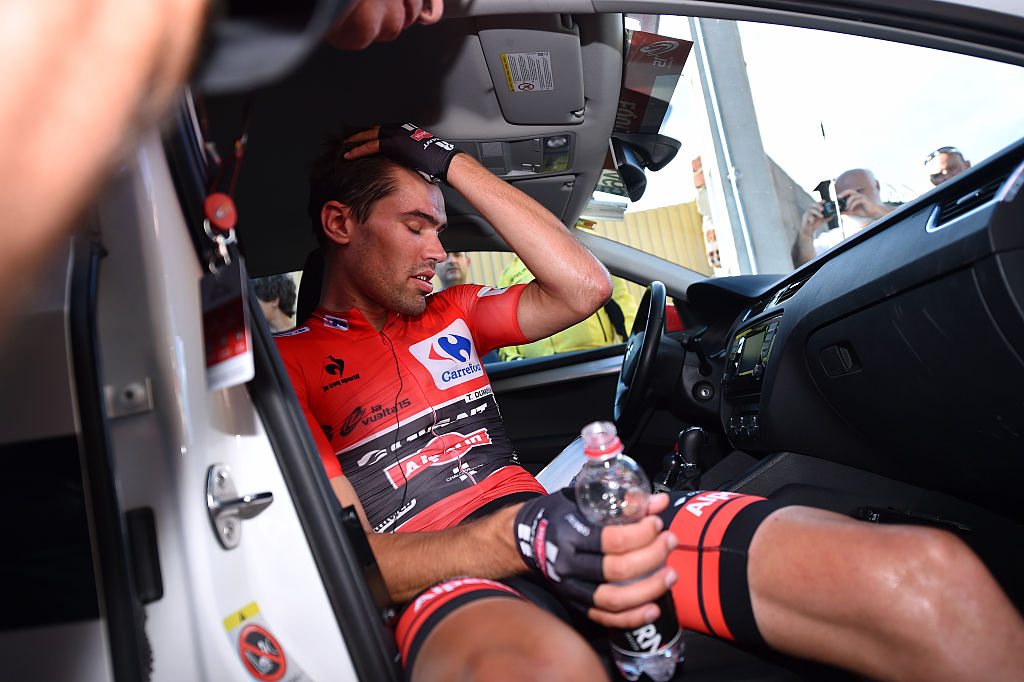
That winter, on the eve of the Giant-Alpecin team presentation in Berlin, a pair of journalists found themselves at a dinner table with one of Dumoulin’s teammates. The journalists mentioned Dumoulin’s detailed responses at post-stage press briefings at the Vuelta and the teammate laughed: “That will change once he starts having to do them all the time.”
It never really did. Throughout his career, in moments good and bad, Dumoulin remained that rarest of things – a Grand Tour contender who listened attentively to questions and gave long, considered answers. In recent memory, perhaps only Egan Bernal came close to matching Dumoulin’s loquaciousness in a leader’s jersey. Every now and then, he would vow to be more guarded, like when a translated version of his querying of Bradley Wiggins’ therapeutic use exemptions went viral in 2016, but the self-imposed restrictions rarely lasted too long.
When his former teammate Georg Preidler confessed to doping in 2019, Dumoulin even asked why he wasn’t being asked to comment on the case more frequently. “Journalists have to keep this alive,” Dumoulin said. “I think it’s really important to remain sceptical.”
Dumoulin’s penchant for talking certainly didn’t slow him down, though his actions began to speak ever more clearly in the years after that Vuelta heartache. In 2016, he won the opening stage of the Giro on home roads in Apeldoorn and led the race for the bones of a week. At the Tour, he won a mountain stage in Andorra and then the long Ardèche time trial, where he also served as a most eloquent spokesperson for the peloton’s grief on the day after the July 14 terrorist attack in Nice. Despite breaking his wrist in the final week of that Tour, he returned in time to take silver in the time trial at the Rio Olympics.
The following season, Dumoulin focused squarely on the Giro, and he would emerge victorious from arguably the best edition of the race in the WorldTour era. The cornerstone of his triumph was his dominant display in the Montefalco time trial, though his calm management of the maglia rosa was just as striking. At Oropa, he reasoned attack was the best form of defence, surprising the pure climbers with a late acceleration.
In the shadow of the Stelvio, meanwhile, he remained somehow unruffled even after the indignity of taking an unscheduled natural break before a global television audience. Dumoulin’s resolute defence of his jersey in Bormio, followed by his measured concession of the tunic in Piancavallo, allowed him to claim it permanently from Nairo Quintana in the final time trial in Milan. The year ended, almost inevitably, with the world time trial title in Bergen.
From a purely athletic standpoint, Dumoulin’s 2018 was even more impressive, even if it lacked the same emotional high. He placed second overall at both the Giro and the Tour, then took silver in the Worlds time trial and fourth in the road race. At the Giro, Dumoulin would have been full value for overall victory after a gripping duel with Simon Yates, but he had the misfortune to be outflanked by Chris Froome’s illogical solo over the Finestre.
Still, by season’s end, Dumoulin looked the man best placed to challenge Sky’s hegemony in the Grand Tours in the years ahead. The future was his.
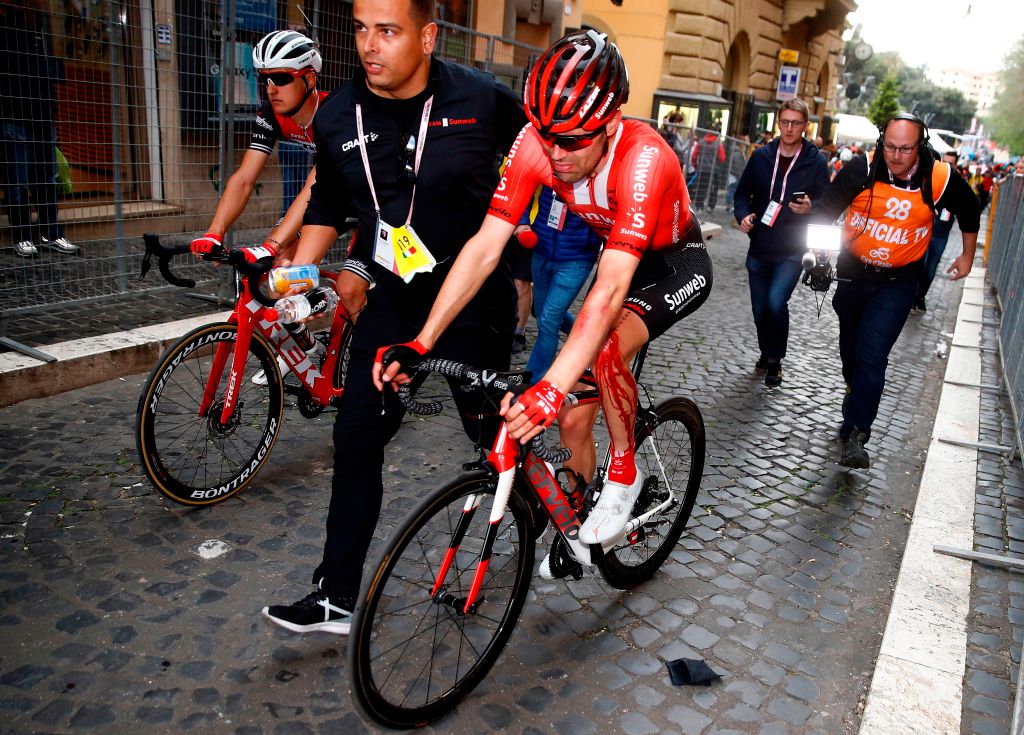
And then, all of a sudden, it wasn’t.
In hindsight, the beginning of the end of Dumoulin’s career came about 6km outside Frascati on a grey afternoon in May 2019. Dumoulin had returned to the Giro, drawn by a course heavy on time trial kilometres, but a crash on the run-in to stage 4 ended his challenge. Despite the injury to his knee, he made a forlorn attempt to start the next day, but he lasted barely a mile before climbing off.
Seven months of preparation had come undone in an instant and the setback can only have added darker shades to some of the doubts Dumoulin had already sketched out in an interview with Procycling in February of that year, when he was cloistered in the Hotel Parador in Tenerife to prepare for the new season. There are no distractions from the work at hand atop Mount Teide, but there is also precious little to divert a cyclist’s attention from the central absurdity of his profession: why do it?
“Why do you completely suffer through it? It’s not easy, because you have to find new ways of smashing yourself and find new places of pain, and why do you do that?” Dumoulin said that afternoon, recounting a conversation with Sunweb coach Brian Stephens.
“I think I just like the journey, and I think any rider likes that journey. Brian also said, ‘if your only ambition in your cycling career is to win the Tour de France, then what are you going to do if you win the Tour de France?’ Is that it, do you stop cycling? So somehow there is some sort of motivation outside the result, and that is everything that comes with it on the bike, like being free. I think that’s it.”
The problem for Dumoulin, perhaps, was that cycling was now no longer synonymous with freedom. After being feted on his return to Maastricht following the 2017 Giro, he had already expressed unease at the adulation of crowds who had come out “to clap for a boy who can ride fast,” noting that nobody cheers when a doctor saves a life.
“For some people I’m sort of a hero and that’s weird,” Dumoulin said in 2019. “I didn’t want to be, so I struggled a bit with that, and with how my personal life got involved with my working-cycling life. Everything around riding a bike somehow distracted me a little bit from what I liked about cycling.”
Dumoulin’s injury would prevent him from lining out at that year’s Tour and by summer’s end, he had brokered an early release from his contract with Sunweb. Others, like Marcel Kittel, Michael Matthews and Warren Barguil, have done the same over the years, but Dumoulin’s departure felt somehow different. It seemed to have less to do with the constraints of racing in Iwan Spekenbrink’s micro-managed team than with the sheer weight of being Tom Dumoulin.
By moving to Jumbo-Visma to join a team that already had an established leader in Primož Roglič, Dumoulin believed he was relieving himself of a burden. But try as he might to evade it, the burden continued to find Dumoulin. The demands, physical and psychological, remained stubbornly in place.
A stomach issue delayed his debut for his new team, while his decision to leave the Movement for Credible Cycling, due in part to Jumbo-Visma’s stance on ketones, generated a minor furore. By then, the 2020 cycling season had been interrupted by the coronavirus pandemic, and Dumoulin was left with his thoughts all over again. One photograph taken during the lockdown showed him sitting on his turbo trainer at home, his feet perched on the handlebars. It was a position he sometimes used to adopt when talking with reporters after warming down outside his team bus, but his thousand-yard stare here was striking.
That stare was on show again on the final weekend of the Tour, where Dumoulin rode to seventh overall while helping Roglič towards what had seemed like certain victory. The abiding image of Tadej Pogačar’s heist at La Planche des Belles Filles was of Dumoulin and Wout van Aert gazing darkly at the big screen beyond the finish, slowly realising that all their efforts had been for nothing.
An exhausted Dumoulin lasted a week at that year’s pandemic-delayed Vuelta before calling time on his season. The hunger never returned over the winter, and on the eve of the 2021 campaign, he announced that he was taking an indefinite sabbatical from cycling due to burn-out.
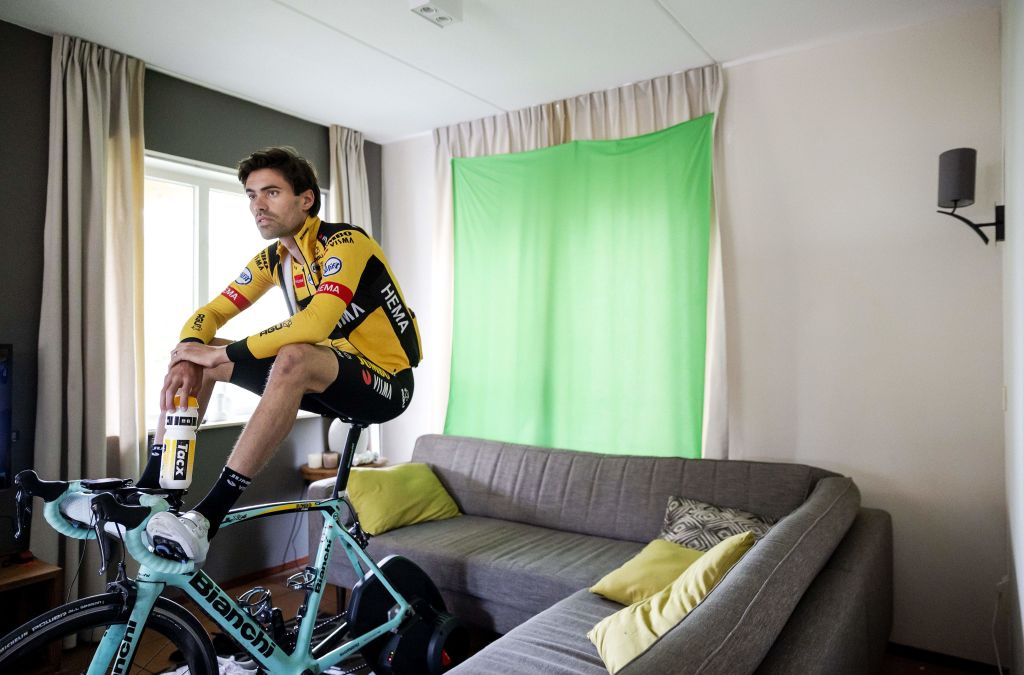
A visit to last year’s Amstel Gold Race encouraged Dumoulin to return to racing, with the Tokyo Olympics as a goal. He had grown up venerating the Olympics rather than the Tour, and preparing expressly for the time trial seemed to rekindle the flame. For a time, it looked as though his second act might be an enduring one.
After winning the Dutch title in the discipline, Dumoulin took silver behind Roglič in Japan and he began to contemplate the idea of having another tilt at three-week racing. The Giro, inevitably, was the chosen theatre, and he arrived at the start in Budapest in May evincing optimism. “A happy man goes a long way,” he smiled.
But every true story has an anti-climax, as John Updike wrote of Ted Williams’ final appearance for the Boston Red Sox in 1960. Dumoulin’s Giro didn’t finish on the final podium in Verona, but en route to Turin on stage 14, when he climbed off with a nagging back injury. His general classification challenge had already ended atop Mount Etna, and it was already clear that he would never again be seen in a Grand Tour. Three-week racing has changed utterly in the half-decade since his Giro win, as this year's Tour forcefully demonstrated.
A couple of days after the Giro finished, Dumoulin announced that he would retire at season’s end, with the time trial at the Wollongong World Championships serving as his swansong. But that wasn’t to be, either. His final bow as a rider would instead be his abandon at last month’s Clàsica San Sebastian.
Dumoulin’s decision to retire at just 31 years of age highlights once more the ever-increasing demands of professional cycling. Like boxing, it has always been a hurt business, but the quest for the most incremental advantages – weight loss in particular – has lent it a certain joylessness in recent years. Or as Dumoulin wrote earlier this summer: “For a while now there has been a disbalance between my 100% dedication, everything I do and sacrifice for the sport, and what I subsequently get out of it in return.”
Fabio Aru, Dumoulin’s rival from the 2015 Vuelta, arrived at a similar conclusion last summer, and one senses they won’t be the last high-profile riders to step away from the sport while still ostensibly in their primes. The problem, it seems, isn’t so much of physical strength as of mental bandwidth, hence the steady trickle of road riders towards the relative freedom of the gravel scene.
In taking a sabbatical last year rather than staying silent, and in stepping away now rather than persisting blindly, Dumoulin may have performed his sport some service, though it remains to be seen if anybody is paying much attention. In cycling, the focus always shifts quickly to the next rider and the next race. For every Dumoulin or Aru who steps away, there are a dozen ambitious juniors vying to take his place. The cycle repeats itself over and again.
Then again, Dumoulin always had a curiosity about the world far beyond his front wheel. Before the start of the 2018 Giro in Jerusalem, riders were given firm instructions not to venture beyond three recommended training routes far outside the city. On the evening he arrived in Israel, Dumoulin weighed up the available options and figured he'd ride into Jerusalem anyway.
“I took the bike, and I rode a lap around the Old City and also through the Old City,” Dumoulin said the following morning. “I was in my normal clothes but on my special bike, and getting a lot of eyes on me: 'What is this guy doing?'"
The bike rider was only ever but a part of the man.

Barry Ryan was Head of Features at Cyclingnews. He has covered professional cycling since 2010, reporting from the Tour de France, Giro d’Italia and events from Argentina to Japan. His writing has appeared in The Independent, Procycling and Cycling Plus. He is the author of The Ascent: Sean Kelly, Stephen Roche and the Rise of Irish Cycling’s Golden Generation, published by Gill Books.
